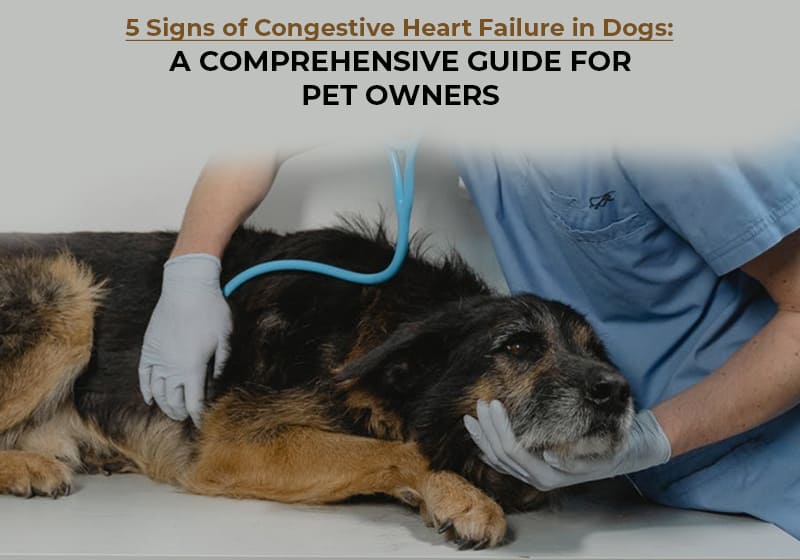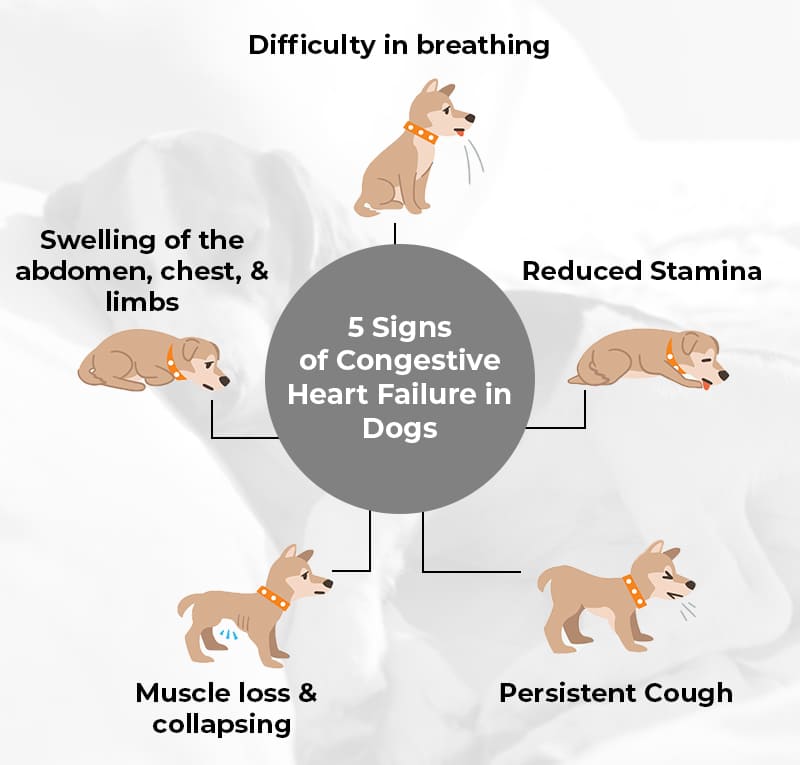
Congestive heart failure (CHF) is one of the heart problems that may occur in a pet at any stage of their life. As the condition develops, it’s important for pet parents to be aware of the signs of congestive heart failure in dogs. Recognizing these signs and symptoms in time can help you get the necessary care and treatment for the healthy life of your pet.
In this blog, we will discuss 5 common signs of congestive heart failure in dogs. This article will help you recognize the early signs of CHF so that you can tell if your dog is experiencing this condition and seek immediate veterinary care.
But first, let’s understand what congestive heart failure in dogs is.
What is Congestive Heart Failure in Dogs?
Congestive heart failure (CHF) is a condition in which the ability of the heart to pump blood is compromised. As the heart is not able to pump the blood properly, this blood accumulates in the lungs and abdomen, causing congestion and making breathing difficult. This causes a variety of symptoms and health issues.
5 Common Signs of Congestive Heart Failure in Dogs

1. Persistent Cough
The first sign of CHF in dogs is usually persistent coughing. This especially happens when the dog is lying down or at night. While this coughing can be related to some other health condition, if your dog has a cough that hasn’t cleared up in a few days, it may be due to CHF.
This is mainly caused by the accumulation of fluid in the lungs. Most of the time, it’s a dry cough, but in some situations, it can be a wet cough with or without blood in it. The coughing worsens as the disease progresses. If your dog has been coughing persistently for more than a few days, consult a vet soon to get an early diagnosis and start appropriate treatment.
2. Difficulty in Breathing
Another common sign of congestive heart failure in dogs is difficulty breathing, which is medically referred to as dyspnea. Additionally, a dog’s tongue or gums may seem a bit bluish. This indicates low oxygen levels in the blood due to the inefficiency of the heart to pump blood or the buildup of blood in the dog’s chest cavity.
This often results in rapid breathing or a wheezing sound when the dog sleeps. The dog may also pant or breathe with its mouth wide open and have a fast or irregular heartbeat. Difficulty breathing can be associated with other disease conditions as well. However, if your dog has a history of heart problems, it is best to consult your vet as soon as the symptom is observed.
3. Reduced Stamina
As CHF progresses in dogs, their stamina is significantly reduced. This mainly occurs due to the heart’s inability to meet the body’s oxygen demands.
During physical exercise and activities, the body demands more oxygenated blood. However, in dogs with CHF, the heart is unable to meet this demand. This causes fatigue and weakness in the dog. Some dogs may also collapse after a short exercise.
If your dog is getting tired after a short period of physical activity and you notice the above-mentioned signs as well, it is of utmost importance to visit your vet.
4. Swelling of the Abdomen, Chest, and Limbs
Swelling in the abdomen, chest, and legs may develop in later stages of the disease. The swelling in the chest and abdomen may occur due to the buildup of body fluids in the lungs and chest cavity. Fluid retention also results in increased pressure in the veins, causing swelling in the limbs due to fluid not returning to the heart. This indicates the end stage of congestive heart failure in dogs, and it can be a tough time for both the pet and the parent.
5. Muscle Loss and Collapsing
In dogs with the last stage of CHF, muscle loss accompanied by a swollen belly is observed. As the heart becomes very inefficient in the later stages of the condition, the muscles and associated structures do not get adequate blood supply. This results in muscle loss and weakness. The pat may also collapse or faint due to the weakness.
If you are unsure why your pet has fainted or collapsed, seek immediate vet consultation. It could be due to CHF, but it could be some other health condition. A vet would be the best to diagnose the issue.
Congestive Heart Failure is not a death statement
Many pet parents find it difficult to accept that their beloved pet has CHF and also lose hope for a positive outcome. It is obvious to feel this way, given the seriousness of the condition. However, CHF doesn’t mean the end of life for your pet. Your pet can still have a good life with proper treatment and management. With early diagnosis and appropriate treatment, pets with CHF can have a long and healthy life.
A Few Tips for Managing CHF in Dogs
Following are a few tips that will help you manage CHF in your dog as well as cope with the emotional stress:
- Get routine checkups for your dog.
- Monitor their breathing and coughing.
- Pay attention to their diet.
- Use supplements to support their nutrition.
- Keep them calm and relaxed, away from stress.
- Monitor their weight.
- Keep them active with regular exercise.
- Spend more time with them.
- Be familiar with locations for emergency care.
Wrap-Up – Your Dog is Strong, So Are You!
Managing CHF in your dog can be emotionally challenging, but remember that your dog is strong and resilient. It’s important to stay positive and provide them with the love and support they need during this time. With proper treatment and care, you can ensure a healthy and quality life for your pet.
